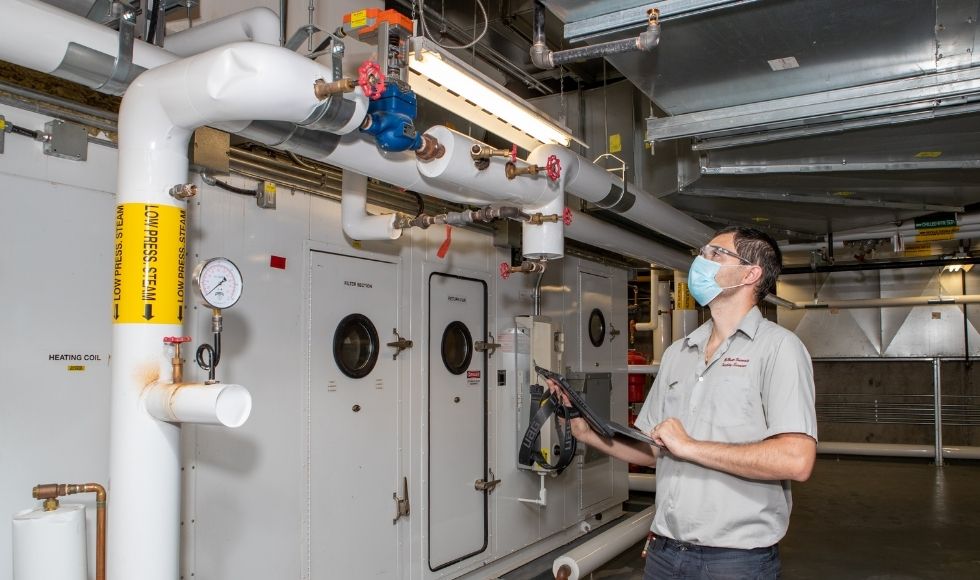Ventilation team is ready for next year

Nathaniel Pirocchi, HVAC controls mechanic, assesses part of the ventilation system in the Peter George Centre for Living and Learning.
McMaster University’s Utilities team has worked hard to improve ventilation by adopting new best practices, making it an important part of the institution’s approach to COVID-19 safety.
As we start a new academic year, our ventilation systems are being maintained at the same high standards. Alvin Baldovino, assistant director of engineering operations on the Utilities team helped lead the ventilation plan and offered the following answers to commonly asked questions.
What is McMaster’s ventilation plan for this year?
Safety for the McMaster community continues to be our priority. The rigorous ventilation protocols we developed last year will remain in place for the fall.
This means that we will continue to maximize fresh air and frequently refresh the high-standard MERV-13 filters in all mechanical return air systems on campus. We measured over 470 classrooms and lecture halls on campus to confirm they meet six equivalent air changes per hour (eACH), a standard considered ideal by Harvard T.H. Chan School of Public Health’s Healthy Buildings for Health guidelines. In classrooms or lecture halls that did not meet our target, we changed operations to increase airflow and installed more than 250 standalone high efficiency particulate air (HEPA) filter units to meet our target.
How is McMaster maintaining the ventilation systems on campus?
Since the start of the pandemic, our team has been regularly assessing, maintaining and improving all the 150-plus return air systems on campus. We replaced all return air filters on campus with MERV-13 filters, and we are replacing them at an increased frequency. We are also overriding our system to bring in as much fresh air as possible indoors.
We are also maintaining over 250 standalone HEPA filters in classrooms and lecture halls required to meet our standard by conducting regular checks and filter replacements.
How is McMaster addressing buildings without mechanical ventilation systems?
Out of the 56 buildings on campus, only five do not have mechanical heating, ventilation and air conditioning (HVAC) systems. Classrooms and lecture halls in these buildings have HEPA filter units installed. My team created and shared a list of buildings on campus, indicating which buildings have mechanical ventilation systems. We provided HEPA filter units upon request in offices and meeting rooms in buildings without mechanical ventilation. If a team plans to occupy an office or meeting space in a building without mechanical ventilation and a HEPA filter unit has not been installed yet, please contact FSUtilitiesClerk@mcmaster.ca.
Where can I learn more about McMaster’s ventilation plan?
Transparency about our plan is important, because we know that our community wants to know about what we’re doing to help keep people safe. Last year, as we added new elements to our ventilation plan, we added more information to the web page. We welcome feedback from our community and any questions can come to FSUtilitiesClerk@mcmaster.ca.

